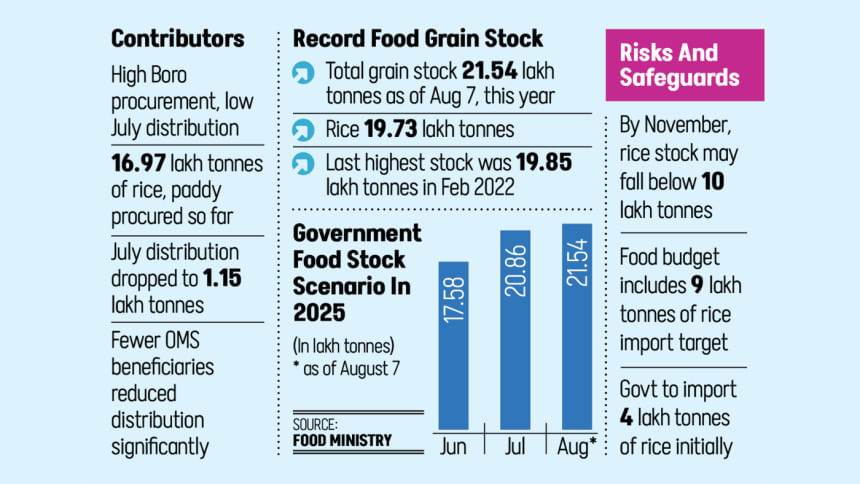Govt food grain stock hits historic high

Bangladesh's food grain stock has reached an all-time high of 21.54 lakh tonnes, as strong Boro procurement and lower distribution in July helped shore up reserves.
As of August 7, of the total, rice accounts for 19.81 lakh tonnes, wheat 1.73 lakh tonnes, and paddy nearly 98,400 tonnes, according to the food ministry data.
This surpasses the previous highest stock of 19.85 lakh tonnes recorded in February 2022, including 16.99 lakh tonnes of rice and 2.86 lakh tonnes of wheat.
"This record has been achieved due to good Boro production, a record amount of procurement, and alignment between market prices and government purchase rates," Md Masudul Hasan, secretary of the Ministry of Food, told The Daily Star yesterday.
The Directorate General of Food data showed that the lower distribution of government food grains in July also contributed to the stock reaching a record high.
According to the food secretary, this precautionary measure is being taken to ensure there is no rice shortage in the country, even if the upcoming Aman paddy harvest is affected.
Boro paddy, which accounts for more than half of Bangladesh's annual rice output, was cultivated on 50.69 lakh hectares of land this year, with a production target of 2.26 crore tonnes.
The government has set a target to procure 35,000 tonnes of paddy, 14 lakh tonnes of parboiled rice, and 35,000 tonnes of non-parboiled rice in the season.
The procurement price has been fixed at Tk 36 per kg for paddy and Tk 49 per kg for rice. This Boro procurement drive, which began on April 14, will continue until August 31.
As of August 6, about 16.97 lakh tonnes of Boro paddy and rice had been procured, according to data from the Directorate General of Food.
"The amount of paddy and rice the government has procured so far is also the highest in Bangladesh's history," Md Moniruzzaman, director for the procurement division of the directorate.
"This has been made possible due to the government's prior planning regarding food security."
According to the Ministry of Food, the government's food grain storage capacity has also increased to 23.88 lakh tonnes in the current fiscal year following the completion of four modern silos in Madhupur, Barishal, Mymensingh, and Narayanganj.
Officials from the ministry further said ensuring food for nearly 18 crore people has become a major challenge for the government, as the amount of arable land for food grain cultivation continues to shrink.
Ministry sources also said that seven silo warehouses are currently under construction across the country, each with a storage capacity of around 50,000 tonnes of food grain.
IMPORT STILL NECESSARY
Despite the good stock, rising domestic demand, a projected supply shortfall, and the risk of floods have prompted the government to move ahead with rice imports to ensure food security in the coming months.
The government recently decided to shorten the tender submission period for importing 4 lakh tonnes of rice.
Speaking on the matter, Food Adviser Ali Imam Majumdar said, "From July to November this year, the estimated demand for rice distribution at subsidised rates stands at around 13.78 lakh tonnes. In that case, projections suggest that by November 2025, the rice stock may fall below 10 lakh tonnes."
The marketable surplus of Aman rice is usually low. As a result, the internal procurement of Aman is limited, and there is no scope for food grain collection from domestic sources during the September to December period," he also said.
The food budget for the current fiscal year 2025-26 has allocated around 9 lakh tonnes of rice for import and 22.29 lakh tonnes for domestic procurement considering the potential risk of floods in August-September, the adviser noted.
"Besides, from December this year to March 2026, the estimated demand for rice distribution is about 8.83 lakh tonnes, and it is necessary to maintain a safe stock of 13.50 lakh tonnes of food grains," he said.
Total public sector demand for rice in the current fiscal year stands at 26.52 lakh tonnes. Even with a good domestic procurement, the government anticipates a shortfall of 4.03 lakh tonnes, which the initial import plan aims to bridge, according to Imam.
DISTRIBUTION DROP IN JULY
Total distribution in July dropped to 1.15 lakh tonnes, down from 1.65 lakh tonnes during the same period last year, earlier, according to the Directorate General of Food.
Distribution under the open market sale (OMS) programme also declined significantly.
The Trading Corporation of Bangladesh saw its rice distribution under OMS fall by 27,000 tonnes compared to July last year, due to a reduction in the number of beneficiaries from 1 crore to 55 lakh following reported irregularities.
Additionally, as the market price of flour was lower in July this year compared to the same month last year, the distribution of flour through the Directorate General of Food's OMS programme also decreased.
Last fiscal year, the Directorate General of Food distributed 27.80 lakh tonnes of subsidised food grains. In the current fiscal year, this amount has increased to 30.41 lakh tonnes
"This is also a historic record in terms of distribution," said Md Abul Hasanath Humayun Kabir, director general of the Directorate General of Food.
He explained that previously, food grains were distributed over five months each year, but the duration has now increased to six months. Additionally, the number of beneficiaries has risen from 50 lakh to 55 lakh.

 For all latest news, follow The Daily Star's Google News channel.
For all latest news, follow The Daily Star's Google News channel. 



Comments